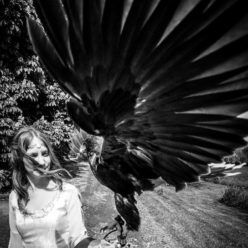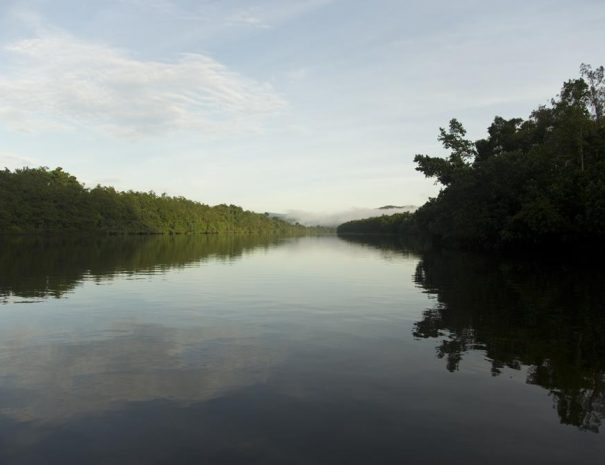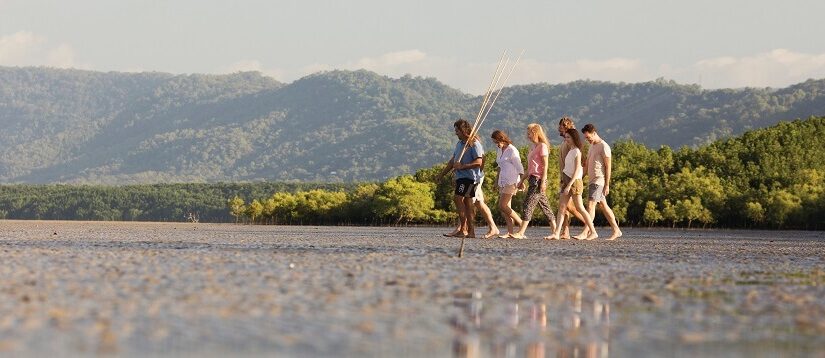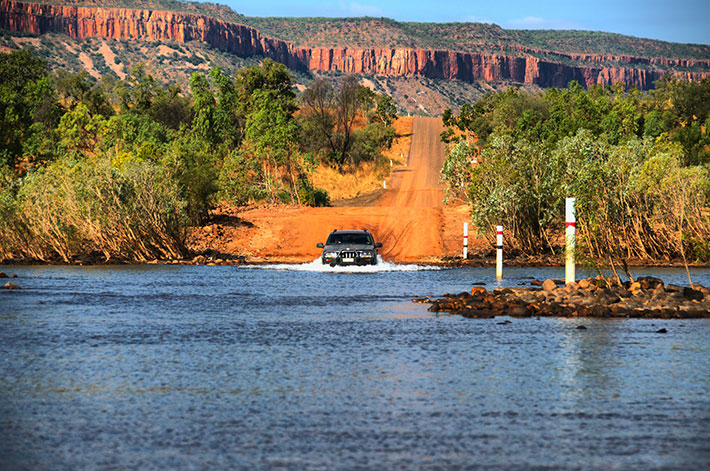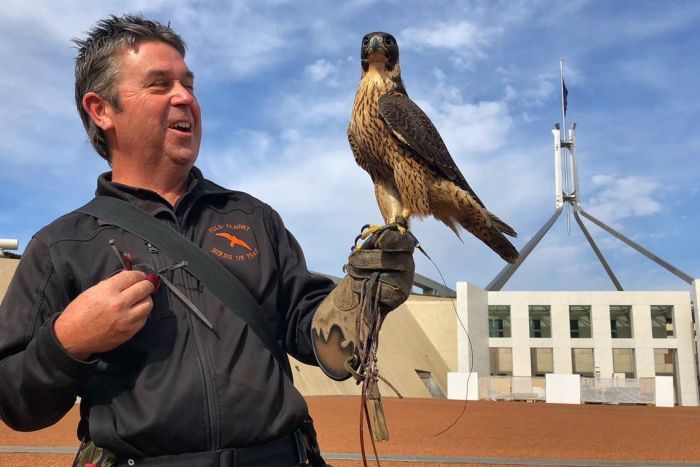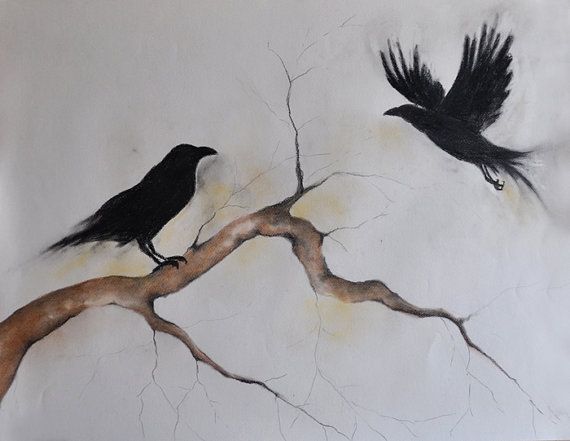‘So this is it, guys! Jump in.’
In, he said. Well, I didn’t quite know what ‘in’ was. I couldn’t see my hand in front of my face, and I was cold and needed a wee. I was aware that there was water of an uncertain depth ahead and while I’d like to use the old metaphor of ‘inky black;’ maybe chuck in a ‘gurgling’ to describe it, I’d be lying because I couldn’t see a bloody thing. The light of my feeble headtorch patchily revealed that the valiant Damo – our guide, had stripped down to his shorts and boots and was rubbing his hands together between hunched shoulders. Then that image was gone pretty quick, lost to the gulping blackness. Apart from the wobbling, unenthusiastic glow of his headtorch ebbing away, I could see nothing else.
I stood on the sand, with the Gentleman nudging me; go on, Chris. But why the fuck, I thought, am I in a pitch-dark cave at 6am about to swim in a flood-swollen, frozen creek infested with goddamn crocodiles?
Well, I didn’t want to be left in the dark on me own for a croc to find, so in you go, – and I did that thing I do when getting in water (only recently discovered, as entering the inclement waters of the Irish, Atlantic and North Seas is not something in which sensible Brits indulge), which, it turns out, is hyperventilate the words ‘shit! fuck! fuck! Ok, I’m in, I’m in, shit! fuck’ and there you are, aloft, kick, swim! Hope your boots don’t weight you down, don’t think about the crocs and get to the other side.
This was the first major spot on our tour of the Kimberley; heading from Broome to Darwin: Tunnel Creek. Despite arriving at the stretching crags of a 350million-year-old coral reef at dawn, swimming that cold creek wasn’t even the first impressive thing I’d done that day. No. That was to meaningfully pick up the shovel and disappear off into the bush. But I’d been keen on getting to Tunnel Creek – I’d been lent a book by my shanty man Bruce about the Bunuba people’s resistance to encroaching and violent pastoralists in the 1880s, led by the heroic Jandamara who evaded capture for years by hiding in these caves. I dunno if he had to deal with crocs. And they were certainly there; as we followed the creek’s strips and pools, careful not to stumble and reach out for the wrong half naked person in the dark; little red eyes at the edges of the caves where they cringed, spread like butter against the walls. Bloody hell. And then walk towards the light, and relief dripped off me, along with the water, as daylight emerged at the other end of the tunnel, festooned with trees, littered with heron and loud with peace. Until Damo pointed out the long, deep imprint of an enormous reptilian tail in the sand, heading from whence we’d come.
‘Right guys, back through the creek again, then!’
FUCK’s sake.
On our way back, we encountered three noisy lads on giant, unicorn inflatables with tinnies. Now we’ve read a lot about crocs, or ‘croncs’ as the Gentleman has affected to call them. Salties can live in fresh or salt water and have a gland that removes the salt. They can come up to 100km upriver. They like to eat small calves, or wallabies, or wallaby sized humans like children and Chrissies. They can lean back on their tail as if it was a fifth leg, just like kangaroos, so pealing you off the roof of your ute isn’t much of an issue. They can even, apparently, climb up waterfalls. Jesus. We have agreed that, along with its weather, you don’t fuck with Australian wildlife. The hippy mantra ‘they’re more scared of you than you are of them,’ rather underestimates the boofhead courage of your average 5 metre fucking salty. But here’s an observation from The Brit Abroad, West Australians and Northern Territorians certainly have an impressive risk tolerance. Or commendable courage. Or they’re just fucken nuts. I pondered the gleeful shouts of those floating blokes the next day while drinking a cup of tea by the bank of the incomparable Manning Creek at 7am, breath caught by the misty golden beauty of the morning. Little fish swam right up to the edge where I sat, then spun round to rub their backs on the sand and flash their silver bellies to the sky. I sipped me tea and watched a white egret on the rock in the middle of the river, patient and still, next to an equally motionless penguin. … … … Why the hell is there a penguin in the Kimberley. I shaded my eyes from the sun, and it shifted, revealing the long neck of a white bellied cormorant. Righto. Animals are secretive and deceitful in this country. Remember that, Chris. What else do you need to remember? Shit. Eyes widening, I hastily interrogated the sand. I couldn’t see any croc tracks, but I took the opportune moment to get the hell away from the river’s edge.
More on crocs later.
We stayed at Manning Gorge two nights. The first day began with an hour’s walk down to the waterfall to go for a swim in the gorge. Damo was pretty convincing about toughening up – you start the walk by swimming across the creek, he said, you’ll be right, he said – there’s little blue barrels to dump your gear in, then you can just hang onto them and kick if you can’t swim. It’s hot, you’ll dry out in no time. Far out. But having done the same thing the day before in the pitch freakin’ dark and much colder water, this was, er, too easy, as they say, so in I got. It was a beautiful river, surrounded by trees, rocks to laze on, birds and the blue, blue sky, I was actually pretty energised getting in. Refreshed, we hiked over the hills through pink wildflowers and cotton flower trees that bear pretty yellow blossoms (right on the end of the branch, with no leaves; imagine a magician’s wand when it spurts a bouquet out the end) and eventually got down to the waterfalls and swimming pools of Manning Gorge. It was glorious. Red, red rocks curved their arms around us, and slabs floated in the water, sprouting shady young, green eucalypts. Vivid scarlet dragon flies landed anywhere you threw your eyes. Fishes swum up to the rocks and gawped at us and rainbows capered in the waterfall’s spray. Like, ya know those screen saves on your computer of magic places you don’t really think exist? It was just like that.
The whole adventure was very much walk to a gorge, get in the gorge, walk to another gorge, get in that one too. Which was great, because if the Gentleman and I had been driving the road alone, I don’t know we’d have committed in quite the same way. Despite the children running around with pool noodles stuffed into their rucksacks and really making a go of it. After dutifully getting in Tunnel Creek, Bell’s Gorge, Manning Gorge and the waterlilies of Galvan’s Gorge we headed off to El Questro Station across the Pentecost River.
El Questro had been talked up a fair old bit by old Greg, camp guitarist, singer, American accent talker and teller of tall tales. After five nights of sleeping in the bush, this camp site had a bar, he said. Steady on, I insisted, after all, we have campsites with bars in them even in Grimsby. (For those that don’t know, this is a thoroughly uninspiring north-east corner of the UK.) And we were packing a hell of a lot of juice – the Gentleman and I had not expected it to be quite the booze cruise it turned out, but Damo is there to be our guide and make sure we have a good holiday, and when it’s dark and the activities are done, what else is there to do but sit round the fire, drink beers and sing? A bar would at least ease the pressure on the icebox, furtively betraying us beneath our seats in the giant 4-wheel drive van by piercing our unopened cans with the combo of sharp ice and rough roads. The bar delivered (until we drank it dry), and as El Questro is an enormous cattle station, occasionally you’d see a cow wander around. These must be some of the most lean, free range organic beef cattle in the world, but who knows how many there are because there are no fences, and you have to get an external company in with helicopters and special gear to hunt down and round them up for selling. But here we were at the feet of the Cockburn Ranges (Australia pronounces all the letters, to my glee), the Pentecost River flowing by and the tall rocks heated up creeks to keep the Zebedee springs at a beautiful 38 degrees all morning. We were in them at 7am, lolling around in hot water between pandanus and ferns like a luxury tropical bathhouse. Apparently, they chuck all the proles out at midday and then the hot springs are the exclusive reserve of the posh lodges where celebrities are helicoptered in. They can keep it – who wants to be in hot water after midday? They’ve missed the best bit! True to that, we left Zebedee springs to hike to Emma Gorge; the coldest waterfall of the tour. Striding up the rocks we passed a limpid blue, sunlit and sparkling pool. Can’t we stop here, Damo? No. Get in the cold one. So we did and it was the true sublime; my breath was taken away by water kept in the shade all day by the enormous cliff surrounding it, the water was deep and murky, I swam towards the yawning black wall that was so tall as to block the great fiery sun and my soul expanded in the terror.
Right after I got out, someone shouted that they’d found a hot spring by the other wall. Bastard.
